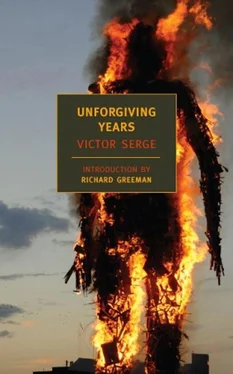He knew so many of the victims — tortured, executed — by their names, their faces, their weaknesses, their eccentricities, their talents, their journeys, their service records, their bookshelves, their greatness, that he had to stop himself remembering them for fear of being overcome by a demoralizing fatigue. Repressed, they massed within him to form the anonymous “cohort,” the dark “Number.” We fancied ourselves as the “iron cohort,” the elite of the elect, that was us! Our hubris has been properly punctured. The dark Number was arrived at by means of scrupulous cross-checks, and varied with the degree of bitterness, rebellion, or pity felt at the moment; in any case, it ran to five figures. So many victims.
What is “conscience”? A residue of beliefs inculcated in us from the time of primitive taboos until today’s mass press? Psychologists have come up with an appropriate term for these imprints deep within us: the superego, they say. I have nothing left to invoke but conscience, and I don’t even know what it is. I feel an ineffectual protest surging up from a deep and unknown part of me to challenge destructive expediency, power, the whole of material reality, and in the name of what? Inner enlightenment? I’m behaving almost like a believer. I cannot do otherwise: Luther’s words. Except that the German visionary who flung his inkwell at the devil went on to add, “God help me!” What will come to help me?
The big newspapers don’t have a conscience (he had bribed them often enough, through savvy intermediaries, to know that) and the little ones don’t count. The big writers wouldn’t believe me. Those who might, wouldn’t understand me, and it is not me that must be understood, it’s the nightmare of a sick power and the demise of a whole category of thinking men. Writers prefer other subjects anyway, less compromising, more commercial… I won’t say anything, not a word. If six months from now finds me quietly in Paraguay or California, I’ll order piles of psychology books and settle down to a study of conscience, the superego, the ego, and suspicion, the obsessiveness of suspicion, the sudden urge to liquidate the finest as though to become their equals by replacing them… My notions of all that are probably out-of-date. And there’s no such thing yet as social psychology. A day will come when people feel unable to live without such knowledge — more important than the knowledge required to build a machine. Catastrophes don’t need it. A psychology based on drilling men into obedience is quite sufficient for the Education Authority, the Psychiatric Service of the Public Health Secretariat, the Military Morale Office, the Politburo, or the Longevity Institute, devoted to the preservation of State cadres (whom the same State is destroying). Meanwhile these institutions, viewed as a whole, are working to prepare the catastrophes: the circle is closed.
D had the driver stop in front of a small café in Neuilly. Sitting at a white marble table, he ordered some ham and a glass of wine. His depression was lifting. A mysterious ballet where dark thoughts, beams of light, and profound instincts choreographed by an unknown director played out in his mind: physiology plus the spiritual X. The taxi driver, drinking at the bar, was discussing with the patron the finer points of cooking hare in white wine. D felt a rush of friendship toward these two men. Enough of this cerebral debauchery! The noose has been cut. Now to overcome the effects of my overwrought nerves. A little pride, old man, you’re one of the strong type. (It’s worth telling yourself this from time to time, if only as a means of autosuggestion…) He mentally reread the letter he had addressed the day before to the Special Envoy, twenty lines of calculated platitudes, yet containing this clear and honest passage:
…So deeply do I disapprove of what is happening that I find it impossible to carry out duties which are incompatible with doubt and blame. You know of my absolute commitment, repeatedly borne out by my actions. I can only assure you of my definitive retirement into private life, that I vow to say and do nothing that might harm our cause…
A brief memo had followed regarding bank accounts, cases in progress, and liaisons with second-tier agents. It occurred to D that the concepts of disapproval, doubt, and blame (just one would have sufficed) canceled out the “absolute commitment” and the promise. They opened a thousand doors onto problems. They stood in judgment over the Party, the system, the Organization; any individual who judges the group, by the mere fact of such temerity, places himself outside the law. “After all, I was never afraid of being killed.” But now the seriousness of the risk amounted to near-certainty, even as its significance was humiliatingly trivialized. To embrace risk for the sake of the group required no justification. But a risk incurred for oneself? He told himself coarsely: “To live only for oneself is barren — like masturbation.”
“…nicely marinated in white wine,” the driver was repeating. “The onions browned separate. A clove of garlic, nutmeg…” Another voice, slurred and hearty, finished describing the recipe with an appreciative cluck of the tongue: “That, Monsieur, is what I call fine cooking!” “And hare stew?” D broke in happily. “Let me tell you,” said the patron, who was a dab hand with a shotgun. D listened to the instructions without taking them in. How good it would have been to exchange cordial handshakes with these fellows, to meet up for a Sunday’s shooting at Suresnes, to drink Beaujolais together! D’s gloom returned as he paid the bill. The difficult hour of his rendezvous with Nadine was approaching.
* * *
“No adulterers in sight today,” D said with a smile, when they were alone in the discreetly luxurious tearoom.
There was a lovely fold to her eyelids. Her cheeks were full and dimpled, her mouth richly outlined in scarlet. She had a sidelong way of looking you straight in the eye that was at once demure and forthright, the tough candor of a peasant girl from the steppes who has just stepped out of a smart hairdresser’s on the rue Saint-Honoré. Nadine offered her cheek, not her lips: displeased.
“Are you all right, Nadine? No one knows about your return to Paris, do they? Did you follow my instructions without fail — to the letter?”
“Oh, of course I did, what do you think?”
Her voice betrayed irritation.
“It’s extremely important, actually.”
“Well, not more than usual, is it? Sacha, I really hate it when you treat me like a child.”
He insisted: “It’s infinitely more important than you think. So, you didn’t phone anyone?”
The waitress took their order: tea with lemon and pastries. She was hard put to classify these two. Foreign? Lovers, married? She put her money on a heavy breakup scene, with a sprinkling of sentiment over the top like confectioner’s sugar on yesterday’s buns, plus a modest check to prevent hard feelings.
At very bad moments, D would feel muscles cramping while a chill crept over his skin, as though his energies were being sucked deep inside, the better to be healed, the better to pounce. His pupils shrank to pinpoints then. Nadine pulled off her gloves. Knowing him through and through — as she thought — she said, “Don’t make those eyes at me, Sacha. By now you don’t have any lessons to teach me about being careful. And what if I did call Sylvia — surely it doesn’t matter?”
“Ah.”
The stupid mistake. Like a tightrope walker who trips over a bit of orange peel in the street, when at thirty feet up with the drums rolling, he would never have made a false move. One fractured shin bone and that’s the end of the beautiful, brilliant acrobat. Shit!
Читать дальше












